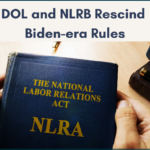THE FACTS
Samantha is a practicing Muslim who applied for a job at Abercrombie and Fitch (“Abercrombie”). The interview process went well and the store manager gave Samantha an evaluation that qualified her to be hired. But there was just one problem: Samantha, consistent with her interpretation of what her religion requires, wore a headscarf. Abercrombie had a uniformly-applied policy that prohibited employees from wearing any kind of “cap” for any purpose. Samantha never mentioned that she would need an accommodation, nor did she mention that she wore the headscarf for religious reasons. However, communications between the store manager who conducted the interview and her boss revealed that they both at least had a suspicion that Samantha wore the headscarf for religious reasons and that it conflicted with the company’s “no caps” policy. The store manager was directed not to hire Samantha because of this conflict. Samantha, through the EEOC, sued Abercrombie alleging that its failure to hire her was a violation of Title VII of the Civil Rights Act of 1964. See E.E.O.C. v. Abercrombie & Fitch Stores, Inc., 2015 U.S. LEXIS 3718 (2015).
THE ISSUE
Under Title VII, employers cannot fail to hire an applicant “because of” the applicant’s religion. So far, no problem for Abercrombie. The issue arises because of Title VII’s definition of “religion”:
“The term ‘religion’ includes all aspects of religious observance and practice, as well as belief, unless an employer demonstrates that he is unable to reasonably accommodate to an employee’s or prospective employee’s religious observance or practice without undue hardship on the conduct of the employer’s business.” (42 U.S.C. § 2000e(j))
So, while Title VII contains no direct mandate to employers to accommodate the religious beliefs and practices of employees, such an obligation is implicit in the way the statute defines “religion.” Abercrombie rightly argued that it had a neutral “no caps” policy and that the reason for not hiring Samantha was her supposed inability to comply with that policy, and not “because of” her religion. However, the accommodation language in Title VII’s definition of religion cannot be ignored.
Thus, it seems that Title VII permits a plaintiff to argue that some adverse employment action was taken against her “because of” her religion, when the claim is really that the employer failed to “reasonably accommodate” the employee’s religious practice. This was exactly the issue the Supreme Court had to grapple with.
THE COURT’S DECISION
The Supreme Court held that Abercrombie impermissibly failed to hire Samantha to avoid having to make an accommodation. It is the employer’s motive behind the action that counts. Thus, “an employer who acts with the motive of avoiding accommodation may violate Title VII even if he has no more than an unsubstantiated suspicion that accommodation would be needed.”
In other words, the employer must have some inkling that the employee’s practice or observance is religious in nature, otherwise no unlawful motive (i.e. discrimination on the basis of religion) could be attributed to the employer. In this case, such a motive was easily attributed to the employer because communications between the store manager and her boss clearly indicated that they both thought Samantha wore the headscarf for religious reasons. Thus, the Court concluded that Samantha’s religious practice was a “motivating factor” in Abercrombie’s decision—which, under Title VII means Abercrombie failed to hire Samantha “because of” her religion.
WHAT EMPLOYERS NEED TO KNOW
This decision illustrates the framework courts will use to deal with Title VII’s religious accommodation language, even though there is no freestanding “failure to accommodate” cause of action in the religious setting. There is basically now a cause of action for disparate treatment based on failure to accommodate a religious practice. Thus, even if an employer has a neutrally-applied policy, it can still be on the hook for discrimination “because of” religion merely by applying the policy to all alike if it conflicts with a religious practice.
Don’t be fooled by the “because of…religion” language: the accommodation language awkwardly included in the definition of “religion” will act as a trap for unwary employers. When it comes to dealing with religious employees who observe practices that conflict with the regular operation of the workplace, it is best for employers to consult with counsel before taking action that seems permissible based on a cursory reading of the statute, but in reality violates Title VII.
For more information about this or any related matter, please contact any member of the KDDK Labor & Employment Law Practice Team.




